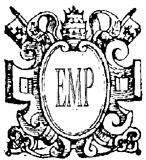SATTB
Penitential
£4.00
EMP1262
Lassus, Roland de (Orlandus Lassus, Orlando di Lasso)
Penitential Psalm VI - De profundis
SATTB
Psalm, Penitential
£4.75
EMP1263
Lassus, Roland de (Orlandus Lassus, Orlando di Lasso)
Penitential Psalm VI - De profundis
SATTB
Psalm, Penitential
£4.75
EMP1274
Gabrieli, Giovanni
Exaudi me Domine a 16 (1615)
Four choirs
Respond, Office of the Dead
£6.00
EMP1275
Gabrieli, Giovanni
Exaudi Deus à 12 (1615)
a 12: see description
Respond, Office of the Dead
£6.00
EMP1276
Gabrieli, Giovanni
Jubilate Deo a 10 (1615)
a 10: see description
Respond, Office of the Dead
£7.10
EMP1278
Gabrieli, Giovanni
O quam gloriosa a 16
a 16: see description
Assumption BVM (August 15)
£6.30
EMP1281
Gabrieli, Giovanni
Magnificat a 8 1597
SMAT ATTB
Vesper Canticle, General Use
£4.75
EMP1285
Hassler, Hans Leo
Jubilate Deo a 15
a 15: see description
Psalm-Motet, Christmas
£6.00
EMP1286
Hassler, Hans Leo
Missa sine nomine a 12
a 12: see description
Mass Ordinary, General Use
£15.10
EMP1287
Gabrieli, Giovanni
O quam suavis 1597
SSAATBaB
Magnificat Antiphon, Corpus Christi
£4.00
EMP1288
Gabrieli, Giovanni
O quam suavis 1597
SSAATBaB
Magnificat Antiphon, Corpus Christi
£4.00
EMP1290
Gibbons, Orlando
Lift up your heads O ye gates
SSAATB
Psalm-Motet, Advent
£4.00
EMP1293
Hassler, Hans Leo
Jubilate Deo a 5
SSATB
Psalm-Motet, General Use
£4.00
EMP1294
Gabrieli, Giovanni
Beata es virgo Maria
SSATBB
Marian Feasts
£4.00
EMP1295
Gabrieli, Giovanni
Sancta Maria succurre miseris
SAATTBB (bc)
Marian Feasts
£4.75
EMP1296
Gabrieli, Giovanni
Quis est iste a 10
TrSMAT ATBaBB
Non-liturgical
£6.00
EMP1297
Byrd, William
Missa 4 vocum
ATBB
Mass Ordinary, General Use
£6.30
EMP1299
Palestrina, Giovanni Pierluigi da
Lamentations III (Fri.)
various
Lesson (Lesung), Good Friday (Karfreitag)
£6.30
EMP1306
Gabrieli, Giovanni
Cantate Domino
SAATTB
Motet general, Non-liturgical
£3.00
EMP1307
Gabrieli, Giovanni
Exaudi Domine
SAATTB
Motet general, Penitential
£3.00
EMP1313
Hassler, Hans Leo
Jubilate Deo a 5
SSATB
Psalm-Motet, General Use
£4.00
EMP1315
Byrd, William
Infelix ego
SMATBaB
Penitential
£6.00
EMP1316
Byrd, William
Infelix ego
SMATBaB
Penitential
£6.00
EMP1317
Hassler, Hans Leo
Missa II (Missa secunda)
SATB
Mass Ordinary, Eucharist
£5.00
EMP1318
Gabrieli, Giovanni
Maria Virgo 1597
TrTrSMA TBBBF
Marian Feasts
£5.00
EMP1330
Croce, Giovanni
Plaudite psallite
SMAT SATB ATBB
,
£10.30
EMP1601
Isaac, Heinrich
Conceptio Mariae Virginis with De radice Jesse
SATB
Motet general, Conception of BVM (December 8)
£4.00
EMP1602
Daser, Ludwig
Missa super Ave Maria
SSATBB
Mass Ordinary, Marian Feasts
£8.70
EMP1603
Tallis, Thomas
Salvator mundi I
SAATB
Antiphon, Exaltation of the Holy Cross (September 14)
£2.50
EMP1604
Lassus, Roland de (Orlandus Lassus, Orlando di Lasso)
Melancholia: Sprüche von Leben und Tod/Aphorisms on Life and Death (Op. Posth.)
SSATTB
£22.50
EMP1605
Anerio, Felice
Factum est silentium
SATB
Respond, St. Michael Archangel (September 29)
£3.00
EMP1606
Hassler, Hans Leo
Missa sine nomine a 12
a 12: see description
Mass Ordinary, General Use
£18.50
EMP1607
Gibbons, Orlando
The Cries of London
SSATTB voices and viols
Secular
£9.50
EMP1618
Croce, Giovanni
Sacre cantilene concertate 1610
£50.50
EMP1619
Croce, Giovanni
Jubilate Deo omnis terra
SSB (+MATB) bc
Psalm at Lauds, Christmas
£3.00


